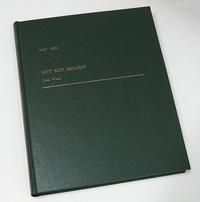« April 2004 | Main | June 2004 »
May 26, 2004
Hot rod biology
This is my book 'Hot Rod Biology'. This is the result of a generative exercise to develop my topic . . . click to see big.
Began as an exercise in developing a hybrid visual language crossing the conventions belonging to Hot Rod magazines and Biology text books. I did this because of each conventions interest in taxonomy. Starting to see the generative capabilities of appropriation lying within the disruption of these kinds of conventions . . . convention uniting form and context.
Posted by Luke Wood at 05:17 PM | Comments (3)
test link
i see adrian has made a list of books.
Posted by Luke Wood at 05:03 PM
May 22, 2004
Topic outline [for review] May 2004
Thought I'd stash this here so I don't lose it and can refer back . . . any comments most welcome of course.
Posted by Luke Wood at 12:03 PM
May 15, 2004
The Dialogic Imagination
Just a quick note to myself here really . . . M. Bakhtin's notion of a dialogic imagination is interesting in terms of an evolutionary appropriation. I started reading Bakhtin yesterday in regard to hybridty.
For Bakhtin, language is by definition a 'hybrid' form . . . developing primarily by means of hybridisation. He references 'borders' and boundaries ñ Homi Bhabha appropriates Bakhtin for his use of the term 'hybrid', although he relates it to the axis of ethnicity only. Bakhtin's use of the term seems much wider and more open.
Bakhtin refers primarily to literature, but what he says can relate to visual language to . . . esp visual languages within popular culture, like graphic design. He suggests literature is a form that allows writers to blend distinct and often oppositional social languages. That the novel's "power consists in it's ability to engulf and ingest other genres" . . . I'd like to relate this back to my investigation into appropriation in graphic design.
By 'dialogic', Bakhtin refers to the notion that a work exists not only in conversation with any works previous to it, but also to works following it . . . that they influence each other. This is in opposition to a monologic relationship where a work is made, influences another, but is not in itself altered by the newer work it has influenced. This is obviously interesting as it implies that an appropriation alters the reading of the thing that is appropriated and vice versa ñ continually (the two works exist in a state of hybridty, never static always changing), an idea I'd had but hadn't found much in relation to theory wise.
What's most interesting about Bakhtin is that his writings pre-date Foucalt, Barthes, Derrida etc by something like 30 years!?
Posted by Luke Wood at 11:20 PM
May 13, 2004
Abstract for this project:
Title: The Hybrid Practitioner : appropriation as an evolutionary catalyst in graphic design
This research programme explores generative possibilities available through the act of appropriation. Howóand at what pointódoes appropriation advance beyond the derivative, and open up new questioning and new paths to the practitioner and audience? Central to this study will be the understanding that as evolution and hybridity are pervasive, all design is appropriation.
The act of cross-cultural appropriation will be explored via a questioning of the values inherent in different notions of identity. The hybrid identities and conflicted relationships that frame this research are symptomatic of graphic designs co-dependent relationship with popular culture.
The projects within this study will be situated in relation to borders and boundaries, spaces where taxonomies fail in the presence of new hybrid forms, as these intersections are seen as rich places in which to locate oneís practice.
Posted by Luke Wood at 08:39 PM

